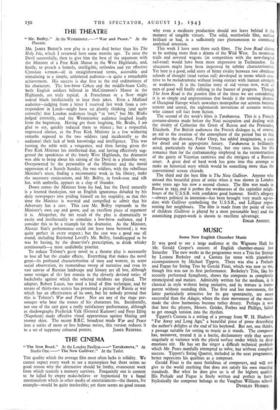Some New English Chamber Music
MUSIC
IT was good to see a large audience at the Wigmore Hall for Mr. Gerald Cooper's concert of English chamber-music last Saturday. The new works in the programme were a Trio for Strings by Lennox Berkeley and a Cantata for tenor with pianoforte accompaniment by Michael Tippett. There was also a Prelude and Fugue for String Trio by Gerald Finzi, which was new to me, though this was not its first performance. Berkeley's Trio, like his recently performed Symphony, shows the composer as completely emancipated and mature. Admirably written for the medium, it is classical in style without being imitative, and its texture is trans- parent without sounding thin. The first and last movements, the latter particularly attractive for its gay spontaneity, are more successful than the Adagio, where the slow movement of the music made the close harmonies become rather dreary. Perhaps it was that here the players, Messrs. Grinke, Forbes and Phillips, failed to get enough tension into the rhythm.
Tippett's Cantata is a setting of a passage from W. H. Hudson's "Far Away and Long Ago," a beautiful piece of prose describing the author's delights at the end of his boyhood. But not, one thinks, a passage suitable for setting to'music as it stands. The composer has, moreover, treated it in a hectic, declamatory style that seems singularly at variance with the placid surface under which its deep emotions stir. He has set the singer a difficult technical problem which Mr. Pears manfully attempted to solve, but without complete success. Tippett's String Quartet, included in the next programme, better represents his qualities as a composer.
Gerald Finzi is the most fastidious of composers, and will not give to the world anything that does not satisfy his own exacting standards. But what he does give us is of the highest quality. His Prelude and Fugue is finely written and perfect in form. Stylistically the composer belongs to the Vaughan Williams school.
DYNELEY HUSSEY.






















 Previous page
Previous page